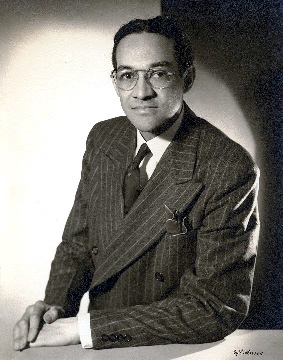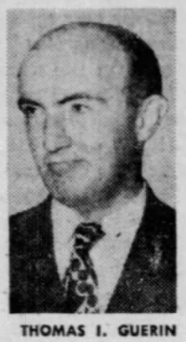
Raymond Pace Alexander was an American civil rights leader, lawyer, politician, and the first African American judge appointed to the Pennsylvania Court of Common Pleas. Born and raised in Philadelphia, he became the first black graduate of the Wharton School of Business in 1920. After graduation from Harvard Law School in 1923, Alexander became one of the leading civil rights attorneys in Philadelphia. He gained prominence as a black lawyer willing to fight for equal rights in the Berwyn desegregation case and represented black defendants in other high-profile cases, including the Trenton Six, a group of black men arrested for murder in Trenton, New Jersey.

Harry Norwitch was an organized labor leader and Democratic politician from Philadelphia.

The 1951 Philadelphia municipal election, held on Tuesday, November 6, was the first election under the city's new charter, which had been approved by the voters in April, and the first Democratic victory in the city in more than a half-century. The positions contested were those of mayor and district attorney, and all seventeen city council seats. There was also a referendum on whether to consolidate the city and county governments. Citywide, the Democrats took majorities of over 100,000 votes, breaking a 67-year Republican hold on city government. Joseph S. Clark Jr. and Richardson Dilworth, two of the main movers for the charter reform, were elected mayor and district attorney, respectively. Led by local party chairman James A. Finnegan, the Democrats also took fourteen of seventeen city council seats, and all of the citywide offices on the ballot. A referendum on city-county consolidation passed by a wide margin. The election marked the beginning of Democratic dominance of Philadelphia city politics, which continues today.

The 1955 Philadelphia municipal election, held on Tuesday, November 8, involved contests for mayor, district attorney, all seventeen city council seats, among other offices. Citywide, the Democrats took majorities of over 130,000 votes, continuing their success from the elections four years earlier. Richardson Dilworth, who had been elected district attorney in 1951, was elected mayor. Victor H. Blanc, a city councilman, was elected district attorney. The Democrats also kept fourteen of seventeen city council seats, losing one district seat while gaining another, and kept control of the other citywide offices. The election represented a further consolidation of control by the Democrats after their citywide victories of four years earlier.

Thomas Ignatius Guerin was a Democratic lawyer and politician from Philadelphia.

William Milton Phillips was a Republican businessman and politician from Philadelphia.

Samuel Rose was a Democratic lawyer and politician from Philadelphia.

Michael John Towey was an organized labor leader and Democratic politician from Philadelphia.

Victor Edward Moore was a Philadelphia businessman and Democratic politician. He served three terms on the Philadelphia City Council and as chairman of the Philadelphia Gas Works.

Philadelphia's municipal election of November 3, 1953, was the second held under the city charter of 1951 and represented the first test of the Democratic city government of Mayor Joseph S. Clark Jr. In the 1951 election, the voters had elected a Democratic mayor for the first time in 67 years, breaking the Republican hold on political power in the city. They had also elected a majority-Democratic City Council along with Democrats for district attorney and other citywide offices. In 1953, the voters had the chance to continue the Democratic trend or to block it in the election for City Controller, Register of Wills, and various judges and magistrates. On election day, the Republican organization recovered from their 1951 losses, electing all their candidates citywide. Republicans celebrated the victory, but subsequent Democratic triumphs in the 1955 and 1959 elections made the 1953 result more of an aberration than a true comeback for the once-powerful Philadelphia Republican machine.

Emanuel Weinberg was a Democratic politician from Philadelphia who served two-and-a-half terms on Philadelphia City Council.
Joseph Lorenz Kun was a Philadelphia lawyer and judge who served for thirty years on the Philadelphia Court of Common Pleas.

1959 Philadelphia's municipal election, held on November 3, involved contests for mayor, all seventeen city council seats, and several other executive and judicial offices. Citywide, the Democrats took majorities of over 200,000 votes, continuing their success from the elections four years earlier. Richardson Dilworth, who had been elected mayor in 1955, was re-elected over Republican nominee Harold Stassen. The Democrats also took fifteen of seventeen city council seats, the most seats allowed to any one party under the 1951 city charter. They further kept control of the other citywide offices. The election represented a continued consolidation of control by the Democrats after their citywide victories of the previous eight years.

Marshall Lorenzo Shepard, Sr. was an American Christian clergyman and politician. Affiliated with the Democratic Party, his political career was focused in the city of Philadelphia.

Gaetano Paul "Tommy" Giordano Sr. was a Philadelphia businessman who served three terms on the Philadelphia City Council as a Democrat.

Philadelphia's municipal election of November 7, 1961, involved the election of the district attorney, city controller, and several judgeships. Democrats swept all of the city races but saw their vote totals much reduced from those of four years earlier, owing to a growing graft scandal in city government. District Attorney James C. Crumlish, Jr. and City Controller Alexander Hemphill, both incumbents, were returned to office. Several ballot questions were also approved, including one permitting limited sales of alcohol on Sundays.

Alexander Hemphill was a Democratic lawyer and politician from Philadelphia who served as City Controller from 1958 to 1968. After service in World War II and graduation from the University of Pennsylvania Law School, Hemphill embarked on a legal career before running for office. In his three terms as city controller, he exposed corruption and malfeasance, often to the discomfort of his fellow Democrats. He ran for mayor of Philadelphia in 1967 against the incumbent Democrat, James Tate, but was unsuccessful, and retired to a private law practice until his death in 1986.

Foster Alexander Dunlap was a Republican lawyer and politician from Philadelphia who served as City Controller from 1954 to 1958.

The 1963 Philadelphia's municipal election, held on November 5, involved contests for mayor, all seventeen city council seats, and several other executive and judicial offices. The Democrats lost vote share citywide and the Republicans gained one seat in City Council, but the Democratic acting mayor, James Tate, was elected to a full term and his party maintained their hold on the city government. The election was the first decline in the Democrats' share of the vote since they took control of the city government in the 1951 elections, and showed the growing tension between the reformers and ward bosses within their party.

Walter Stanley Pytko was a Democratic politician from Philadelphia. Active in Polish-American groups in Philadelphia's Bridesburg neighborhood, Pytko also became involved in local politics. He served one term in the Pennsylvania State Senate in the 1930s and worked in various government agencies through the 1940s and 1950s. In 1962, he was elected to the Philadelphia City Council, where he served until retiring in 1968.















